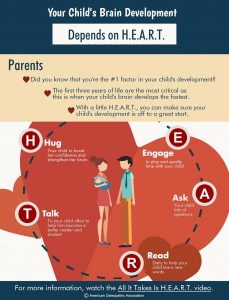Giving your child a strong foundation
A mom or dad playing peek-a-boo with their little one might seem like a simple exchange. But there’s more to the interaction than meets the eye, according to Scott Cyrus, DO, an osteopathic pediatrician in Tulsa, Oklahoma. These seemingly simple communications can help children reach developmental milestones that prepare them to meet life’s challenges.
Parents need to engage children as early and often as possible to achieve key milestones such as taking first steps, saying first words, waving goodbye, throwing a ball or playing make-believe.
The simple act of holding a child can leave a lasting impression. “How parents hold their baby, even just to feed him or her, is significant because of the warmth and comfort the baby feels,” explains Dr. Cyrus. The sense of security will give a baby or toddler the confidence he or she needs to explore their surroundings and helps to build his or her self-esteem.
Piquing baby’s curiosity and strengthening confidence is critical, particularly during the first three years as significant development takes place. In fact, the brain develops faster during the first three years of life than at any other time.
“Parents are a child’s most important role model,” says Dr. Cyrus. “Your child watches your every move, learning important actions from you.”
All it takes is H.E.A.R.T.
That’s why the American Osteopathic Association partnered with the Erikson Institute to create the “All It Takes Is H.E.A.R.T.” campaign. This initiative aims to educate parents on simple steps they can take:
- To strengthen the bond they have with their kids
- To help their children feel secure
- To encourage their independence
Parents don’t need to buy the latest toys to nurture their children’s development. They just need H.E.A.R.T., which stands for:
- Hug: Your child feels love from you each time you embrace.
- Engage: Dr. Cyrus points out that simple interactions are often the most important. “Coloring, even scribbling, can show a child how to move the hand back and forth or how to grasp a crayon, which translates to holding other objects,” he explains.
- Ask: You can stimulate your child’s curiosity when you ask questions. You can even hide an object and ask him or her to find it.
- Read: “Reading is essential to improving vocabulary and encouraging a love of reading,” says Dr. Cyrus.
- Talk: “Your voice has a soothing effect on your child, giving him a sense of security and understanding,” Dr. Cyrus states. When your child hears you speak, he or she will try to copy your sounds, which will help him or her develop language skills.
“The time you share with your child is invaluable and can never be substituted by a television, stuffed toy or a computer game,” stresses Dr. Cyrus.

